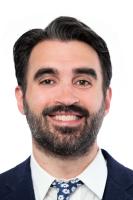Our Approach
Sports neurology is concerned with the diagnosis and management of neurologic injuries that occur during sports participation and neurologic conditions occurring in athletes. Since every injury and affected individual is different, a comprehensive and individualized approach to management is required.
At the Summit Health Sports Neurology and Concussion Center, we focus on long-term brain health and promote safe and lifelong sports participation through emphasizing prevention strategies, baseline testing, and establishing healthy lifestyle habits. Our trained experts manage concussion, post-concussion syndrome, and all neurological conditions in athletes of all ages and levels of competition. Trained to diagnose and manage all disorders of the brain, our goal is early recognition and accurate diagnosis through expedited appointments and comprehensive evaluations. Once the appropriate diagnosis has been determined, we take an active approach to symptomatic treatment and rehabilitation to ensure a safe and efficient return to sports and other activities.
Concussion
We offer comprehensive concussion management from brain health and baseline evaluations through post-injury diagnosis, treatment, rehabilitation, and return-to-learn and -play clearance.

A comprehensive brain health evaluation is an in-depth assessment of an athlete’s neurological function by a pediatric sports neurologist with expertise in concussion. It is the best way to prepare for an upcoming sports season. Knowing how your brain functions when you are healthy will give you an advantage in making a fast and complete recovery.
Concussion baseline evaluations are intended for athletes of all ages and in all sports. This evaluation is recommended to be completed once every 1-2 years, unless there is a change to the athlete’s medical history, or the athlete had a suspected or confirmed concussion within the past year.
This 30-40-minute evaluation includes:
- Review of medical and neurological history including previous concussions and pre-existing issues, including headaches, sleep or mood disorders, cognitive difficulties, etc.
- Detailed neurological examination with concussion focus
Our unique and comprehensive assessments allow for a personalized, case-by-case, approach to patient care that results in:
- A more accurate diagnosis
- A more efficient return-to-play process in the event of a concussion
- Recommendations for safe play, injury prevention, and optimization of long-term brain health
- Discussion about updated concussion diagnosis and management approaches
(Generally billed through insurance as an office visit.)
Patients will have the option to add on an Athlete Functional Performance Assessment
The physical therapists and athletic trainers at Summit Health are an essential part of complete care for concussed athletes. This additional assessment with our highly trained therapists and trainers will evaluate the athlete’s neck strength, endurance, and range of motion, in addition to screening exams of balance and vestibular function, which are often impacted after a concussion. This 20-30-minute evaluation includes:
- Functional Movement Screening
- Discussion of corrective exercises and injury prevention techniques and strategies
- Balance testing
- Comprehensive neck evaluation
- ImPACT Test - Computerized neurocognitive testing (optional, extra 25-30 minutes)
Generally billed through insurance (or Self Pay $50)
Concussion Q&A
A concussion is a temporary brain injury caused by an impact or trauma, leading to abnormal neurological function and a wide range of clinical signs and symptoms. Signs and symptoms of concussion typically start immediately or soon after the impact and will evolve over hours to days.
Symptoms a concussed athlete may report:
- Headache or head pressure
- Memory problems
- Sensitivity to light and/or sound
- Not “feeling right”
- Nausea and/or vomiting
- Feeling tired or fatigued
- Balance problems or dizziness
- Mood changes
- Feeling sluggish, foggy, or slowed down
Signs that may be observed after concussion:
- Loss of consciousness
- Confusion or slowed responses
- Dazed or stunned look
- Inability to recall events prior to or after the hit
- Clumsiness
If there is concern that an athlete has a concussion, it is important to remove them from play immediately. Removal from play does not confirm the diagnosis of concussion, but it is an essential step to avoid potential risk of further injuries. Concussed athletes who are removed from play immediately, have quicker symptom recovery and return to sports compared to athletes who continue playing after a concussion.
Most people with concussion do not need to be seen in the emergency room. Following a suspected injury, they should be observed for the next few hours for signs of a more significant injury. Individuals who are stable or show improvement within 4-6 hours after an injury can be managed at home until an appointment with a physician can be made.
If you notice these symptoms, call 911 or visit an ER/Urgent Care:
- Prolonged loss of consciousness
- Increasing confusion or irritability
- Declining level of consciousness
- Seizures
- Repeated vomiting
- Weakness or numbness
- Extreme or unusual behavior changes
- Slurred speech
- Significant facial or posterior head bruising
- Obvious skull fracture or deformity
It is essential to take good care of yourself after a concussion. Drinking plenty of fluids, eating healthy meals, and getting a good night of sleep in the hours after an injury can help to minimize early symptoms. For treatment of headache within the first 24 hours, medication should be limited to Acetaminophen (Tylenol), but after that point other over-the-counter medications can be used (Ibuprofen/Motrin/Advil, Naproxen/Aleve, etc.).
It is important to be seen by a health care provider with experience in the treatment of all neurological conditions and expertise in concussion management soon after an injury in order to confirm the correct diagnosis and begin appropriate treatment. Ideally, this should be within 24-48 hours of a suspected injury, so seeking an expedited appointment is preferred.
There is no single test that has been established as the best concussion baseline. The most important thing to consider before a season is where an athlete would be seen in the event of a suspected concussion. Ideally, the baseline should be conducted with that person or at least ensure that the baseline information collected will be useful to that provider while managing a concussion.
While there are many commercial tests used as part of a concussion baseline, no single test can diagnose a concussion or determine when an athlete is ready to return to play. An ideal baseline should include a comprehensive medical history, neurological exam, and discussion with a physician about concussion diagnosis and management, long-term risks and benefits, and injury prevention and safe play recommendations. Preferably, a baseline should be done every 1-2 years while an athlete is still playing competitively.
There is a brief period following injury, typically 24-48 hours, where significant rest may be beneficial due to a high symptom burden. This period should be guided by how the patient feels and is not necessary for everyone. If an athlete feels comfortable, he or she should be encouraged to continue or gradually resume usual daily activities (excluding sports) as tolerated (including school, homework, chores, use of technology, social activity, and light physical activity) and to use accommodations early on as needed. The old approach of prolonged rest and avoidance of activity until all symptoms are gone is not helpful and is no longer recommended.
A concussion should heal completely within a couple of weeks and does not cause any permanent impairment. With proper management, athletes can return to their usual activities in a safe and timely manner.
There is no number of concussions that is too many. Every person and every injury is different. Deciding to retire from a sport is a complicated decision that should not be rushed or taken lightly. A comprehensive evaluation and in-depth discussion of all prior injuries, other medical problems, current symptoms and concerns, and long-term risks and benefits of each individual sport is necessary to make an informed decision about continued participation. While our understanding of the long-term risks and benefits of sports participation is continuing to improve, there are still many things we don’t know, and each person needs to be assessed on an individual basis.
Conditions We Treat
- Acute Concussion
- Post-concussion Syndrome
- Concerns about long-term effects of head trauma (i.e. Chronic Traumatic Encephalopathy)
- Long-term Athlete Brain Health
- Neck Strain Injuries / Whiplash
- Peripheral Nerve Injuries
- Burners and Stingers
- All Neurological Conditions in athletes
Treatments and Services
- Concussion Baseline Brain Health Evaluations
- Supervised Dynamic Exercise Evaluations
- Sideline Coverage (*Please call 973-718-5800 to inquire about event coverage*)
- Athletic Trainers
- Physical Therapy
- Vestibular Therapy
- Behavioral Therapy
- Pain Management
Meet Our Concussion Management Team
Matthew McCarthy, MD
Neurosciences, Pediatric Neurology, Sports Neurology and Concussion CenterErin Chevalier, DPT
Physical Therapy, Sports Neurology and Concussion CenterTim Dunne, PT, DPT, OCS, CSCS
Physical Therapy, Sports Neurology and Concussion CenterYan Kharkover, DPT
Physical Therapy, Sports Neurology and Concussion CenterMatthew Reicher, MS, ATC, CSCS
Physical Therapy, Sports Neurology and Concussion CenterWilliam Stanaback, DPT
Physical Therapy, Sports Neurology and Concussion CenterWhy Choose Summit Health
At the Summit Health Sports Neurology and Concussion Center we have a comprehensive team of experts to help with your concerns. Our sports neurology team is specifically trained in the diagnosis and management of neurological conditions and injuries in athletes, including concussion and post-concussion syndrome. Beyond training in general neurology, a sports neurologist has completed additional fellowship training focused on sports-related neurological injures and overall athlete brain function and neurological health.
We work as a multi-disciplinary team all the way from providing an accurate diagnosis through guiding an individualized treatment and rehabilitation plan. Our in-depth, personal approach to care aims to include patients and their families every step of the way.






